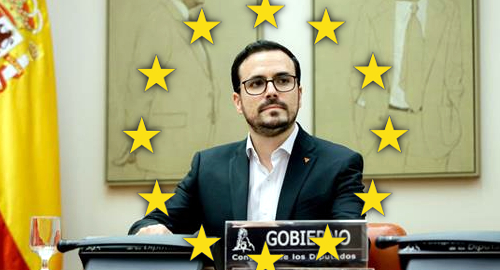 Spain’s harsh new online gambling marketing restrictions will likely take effect in October after the European Commission (EC) voiced no objections to the country’s plans.
Spain’s harsh new online gambling marketing restrictions will likely take effect in October after the European Commission (EC) voiced no objections to the country’s plans.
On Wednesday, Spain’s Minister of Consumer Affairs Alberto Garzón announced that he would press the government’s Council of State to approve by September the Royal Decree on gambling advertising Garzón unveiled earlier this month. Assuming that approval is secured, Garzón (pictured) believes final approval by the Council of Ministers can be obtained by October.
Spain submitted the latest draft of the Decree to the EC for approval on July 9, slapping an ‘urgency’ tag on the measure to ensure the EC got his message that children’s lives were in danger (or something). On Tuesday, the EC declared that it had no issues with the Decree, clearing the way for Garzón to forward the Decree to the Council of State.
Spain is seeking to limit online gambling advertising on TV, radio and online video platforms to a narrow four-hour window starting at 1am. A previous draft of the Decree would have allowed advertising during live sports events but this exception was eliminated in the current draft.
Sponsorships of sports teams, leagues and competitions will also be prohibited, with gambling names and logos to vanish from sports jerseys and stadiums. The government is reportedly mulling whether to allow state authorities to decide if they want to permit pitch-side advertising during matches in their respective territories.
Online operators are also facing tough new limits on bonus offers, restricting them to customers who have made “a minimum of three deposits,” so welcome bonuses would be a thing of the past. The upper limit for acceptable bonus offers was €100 in earlier drafts but the specifics will now be left up to Spain’s Dirección General de Ordenación del Juego (DGOJ) regulator.
Operators shouldn’t expect much mercy from the DGOJ. Earlier this month, Mikel Arana, who was appointed DGOJ chief in May, effectively told stakeholders to either accept the government’s new rules or make a run for the border.
Speaking Wednesday at a meeting of the Joint Committee for the Study of Addiction Problems, Garzón said the advertising curbs were just the first step on the path toward tackling Spain’s problem gambling issues. Garzón said he and other cabinet ministers were discussing the possibility of reallocating some of the license fees paid by online operators toward problem gambling initiatives.
Garzón also warned that land-based operators shouldn’t rest easy, as he would be convening officials from autonomous regions with responsibility for gambling to discuss ways of curbing land-based gambling, with sports betting shops firmly in Garzón’s sights.
Jdigital, the trade group representing Spanish-licensed online operators, issued a seven-point rebuttal to the EC’s decision to bless Spain’s proposals, including a challenge for the government to produce hard data proving that gambling currently represents a public health problem in the country.
Jdigital also took issue with marketing exemptions granted to the state-run SELAE and ONCE lottery operations, which effectively amount to state-aid (something the EC used to harp about quite a bit). The proposals also pose a barrier to entry for new operators, who will lack state-approved means of raising awareness of their brands.
Jdigital and its fellow trade body Cejuego have made many of these arguments before, all of which fell on deaf ears. Barring a miracle or some legal jujitsu, Spain’s government shows no sign of letting up on its plans to neuter the online gambling market.